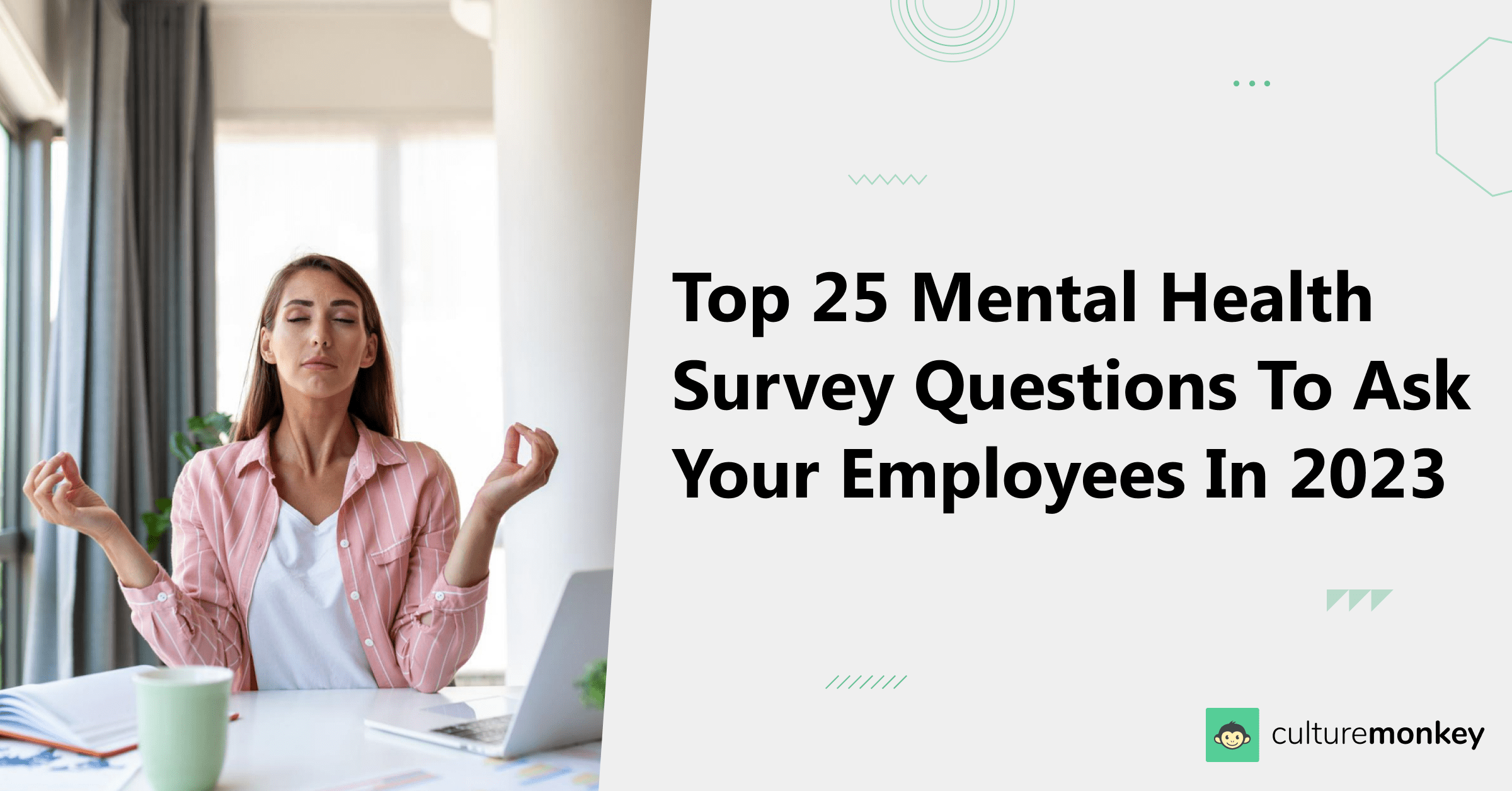Top 25 mental health survey questions to ask your employees in 2023

In recent times, everyone has learned that social interactions play a critical role in employees' overall mental health. The crisis we faced manifested societal disconnection between people in the workplace and at home.
With that said, employee mental health surveys have never been more crucial.
Mental health and mental wellness surveys are top of the workplace's agenda. Employers are stepping forward to support mental health through health initiatives, resource groups, workplace benefits, and other programs. According to a survey conducted by Oracle with 12,000 employees, 89% felt that the pandemic had a negative impact on their good mental health.
Here's where the employees' mental health survey comes in to help you understand how you should, as a people leader, support your workplace mental health. Let's dig deep into why you must implement and support mental health questionnaire before getting to the top 25 questions.

See how mental health survey would look like in CultureMonkey's employee survey tool.
Table of contents:-
- Why are employee mental health surveys important?
- Work-related risk factors that can harm mental health
- How can mental health issues affect work?
- Where does remote working fall short?
- How can employers support employees' mental health?
- What are the mental health questions for employees?
- Hybrid work and mental health care of employees
- 25 best mental health survey questions
- 15 Wellbeing survey questions
- How do you evaluate employee mental health?
Why are employee mental health surveys important?

The pandemic put mental health condition and mental wellness issues under the spotlight amongst people like never before. But for many, mental health awareness have already existed behind the curtains due to some pre-existing conditions.
So, mental issues aren't something employees can "leave outside the office" or "turn off." The conditions will affect employees in their workplace. According to the American Institute of Stress, 83% of U.S. workers suffer from work-related stress, leading them to anxiety, feel overwhelmed at the workplace, and employee burnout.
And the pandemic wasn't easy on employees either, as it harmed their mental health more than ever. According to Mental Health America, depression ranks third among employees' workplace problems, following stress and family crises, and it costs over $51 billion in lost productivity and absenteeism and $26 billion in direct treatment costs. So, if left untreated, depression in the workplace can cost nearly as much as AIDS or heart disease.
So, the days of skipping or ignoring workplace mental health are long gone. Sound mental health resources are vital as it allows coping with challenges at home and work.
A culture of positive workplace mental health resources helps employees remain agile while changing roles and responsibilities. It also guides employees to flourish in their careers, boosts resilience, and manages stress, ultimately allowing them to aim for their highest potential.
Creating a secular workspace for employees at all levels without any discrimination is crucial and achievable through useful data from mental health questions. You must implement the mental health survey to ensure valuable feedback and retain valuable talents.
So, in today's fast-paced and ever-evolving work environment, the importance of employee mental health surveys cannot be overstated. These surveys serve as a critical tool for organizations to gauge the well-being of their workforce and make informed decisions to support their employees.
The insights gained from such surveys provide a roadmap for employers to address the unique mental health challenges faced by their teams. This includes tailoring wellness programs, identifying stressors, and offering targeted resources to mitigate workplace stress and burnout.
Additionally, mental health surveys help break down the stigma associated with discussing mental health issues in the workplace. By normalizing conversations around mental well-being, companies foster a more open and inclusive culture where employees feel comfortable seeking help when needed.
Furthermore, these surveys are not just about addressing mental health problems but also about nurturing potential. When employees feel their mental health is valued and supported, they are more likely to thrive in their roles, unlocking their full potential and contributing positively to the organization's success.
Work-related risk factors that can harm mental health

Work-related risks that harm mental health are psychosocial risks related to specific characteristics of the workspace such as, work schedules, or lack of opportunities for employees' career development, etc. Although psychosocial risks can be in all sectors, some employees are more likely to develop them because of what they do.
According to the World Health Organization, globally, $12 billion working days are lost annually due to anxiety and depression at the cost of $1 trillion yearly in lost productivity.
Risk factors that harm employees in the workplace are:
- Being under-skilled or under-use of skills
- Excessive workloads
- Lack of control over the work structure
- Inflexible, unsocial, or long hours
- Poor or unsafe working conditions
- Inadequate workplace culture that enables negative behaviors
- Limited support or supervision
- Harassment, bullying, or violence
- Exclusion and discrimination
- Under-promotion or over-promotion
- Job insecurity or poor investment
- Conflicting work/home demands
- Lack of work-life balance
- Inequitable pay or compensation disparities
- Unclear job roles and responsibilities
- Lack of opportunities for skill development and career advancement
- High levels of job uncertainty due to organizational restructuring or downsizing
- Lack of recognition and appreciation for contributions
- Inadequate access to resources and tools necessary for job performance
- Overbearing micromanagement and excessive surveillance
Preventing mental health conditions at the workplace is about managing psychosocial risks. Employers should conduct regular interventions through mental health surveys to remove workplace risks of mental conditions. Not only that, mental health surveys can also help to modify or remove workplace risks to employee mental health and pave the way to provide flexible working arrangements and take necessary actions.
How can mental health issues affect work?

According to FreshBooks, an average human spends approximately 90,000 hours in the workplace of their life, which is a seriously significant amount of time.
So, work should also be the source of happiness and fulfillment, but often common mental disorders affect the work and the personal life balance. The following are the ways that mental health can affect work:
Lack of engagement
Employee engagement displays how the employees feel, think, and act in the emotional connection towards their organization, job, and co workers. Engaged employees are motivated to work harder, develop greater solutions, solve problems, stay loyal, and grow along with the company to contribute to organizational success.
According to Gallup, only 36% of U.S. employees are engaged in their workplace and work. To track employee engagement and pinpoint where to devote your efforts, you must determine the engagement level metrics through employee engagement and mental health survey questions.
Misaligned communication
With the pandemic and continuous remote work practices, communication challenges will be around for some time. According to Business Wire, 71% of employees reported feeling more productive when they are more connected to their colleagues. So, leading businesses face these challenges through engagement and mental health survey to ensure employees can effectively communicate wherever they work.
Productivity suffers
Workplace or employee productivity measures the employees' output. The purpose of any organization is to be more successful and grow at a sustainable pace. Here the employees' productivity has the capability to break or make a successful company since the two primary keys to success are effectiveness and productivity.
It is unfair to evaluate knowledge-based workers purely by their productivity output. Quality is often essential, meaning that the final work delivered or the sheer amount of time spent might not be directly related to an employee's productivity. According to Apollo Technical, an average office worker is productive for less than 3 hours per day.
So, in today's knowledge based on the economy, organizations value employees' productivity from the volume of output and other engagement metrics similar to mental health survey.
Poor decision-making
Decision-making plays a valuable role in every employee's day-to-day life and directly impacts the organization's success, whether making daily choices or suggesting new strategies. When employees have better decision making capabilities, it empowers them by leveraging their strengths, expertise, and experiences.
But decision-making can be challenging; according to a McKinsey survey questionnaire, 60% of executives believe bad decisions are as frequent as good ones. So, measuring employees’s mental well being through mental health survey and improving the team mentally fit to make the right decisions in the decision-making process benefits the entire organization since you will have the right mix of skills and expertise.
Reduced physical functioning
Physical and mental health are two sides of the same coin, so it isn't surprising to know that mental conditions can also impact the body. According to the CDC (Centers for Disease Control and Prevention), depression can increase the risks of various health problems, including chronic diabetes, heart disease, and stroke.
As per an IBM study, only 46% of employees feel that their company supports their physical and emotional health. So, when employees aren't physically healthy, they often develop mental conditions, insomnia, difficulty concentrating, and restlessness. Frequent mental health survey will highlight employees' changing expectations and allow you to play an active role in positively impacting employees' physical health.
Increased absenteeism and presenteeism
Mental health issues can lead to increased absenteeism, with employees taking more sick days to deal with their mental and physical health challenges. On the flip side, some employees might come to work despite their mental health struggles, leading to presenteeism, where they are physically present but not fully productive.
Both absenteeism and presenteeism can result in reduced overall productivity and higher healthcare costs for organizations.
Higher turnover rates
Employees facing unaddressed mental health issues may seek employment elsewhere, leading to higher turnover rates. Recruiting and training new employees can be costly and time-consuming. Therefore, organizations that neglect their employees' mental well-being may find themselves facing a revolving door of talent, which can hinder long-term growth and stability.
Impact on team dynamics
Mental health issues can disrupt team dynamics and collaboration. When one team member is struggling with their mental health, it can affect the morale and effectiveness of the entire team. Negative behaviors, conflicts, and strained relationships can arise, making it challenging to achieve common goals and maintain a positive work environment.
Legal and compliance risks
Failure to address mental health issues in the workplace can expose organizations to legal and compliance risks. Various laws and regulations require employers to provide a safe and healthy work environment, including addressing mental health concerns. Neglecting these obligations can lead to legal repercussions, fines, and damage to the organization's reputation.
Impact on customer relations
Mental health issues among employees can also affect customer relations. Employees who are stressed, anxious, or unhappy are less likely to provide excellent customer service.
This can result in dissatisfied customers, lost business opportunities, and damage to the company's reputation. Therefore, investing in employees' mental health is not only crucial for internal operations but also for maintaining positive external relationships.
Where does remote working fall short?

Despite all the positive press about remote working, it isn't what it claims to be in practice. Working from home often leads employees to social isolation, work-from-home burnout, and employment uncertainty. According to Forbes, 45% of employees attended more meetings at home than in the office, and 40% experienced mental exhaustion from video calls while remote working.
Companies were thriving to implement complete remote working successfully, but they fell short in some crucial places, including:
Rapid growth mental health crisis
For most of us, remote working and the pandemic started simultaneously, and it wasn't easy for employees to manage their mental health needs in tough times. According to Harvard Business Review, in the sudden shift to work from home and pandemic, 75% feel more socially isolated, 57% feel more significant anxiety, 67% report higher stress, and 53% say they are emotionally exhausted.
Since employees are facing enormous uncertainty, responsibility, and are unable to handle change, measuring metrics, including mental health surveys, help you identify the place that needs more effort.
Not a fair trade-off
Complete remote work isn't a fair trade-off for everyone; according to the Business News Daily, 40% of employees work longer remotely than in the office. On the other hand, according to the New York Times, remote and hybrid working are overrated as they cannot compensate for lost creativity.
So remote work at times makes it harder for teams to make decisions, exchange ideas, ask or answer questions, collaborate, and be creative.
No work-life balance
Work-life balance is essential in a healthy work environment as it helps reduce stress and prevent workplace burnout. But, according to the Sixth Tone, 47% of leaders do not intend to offer remote or hybrid work anymore as it's bad for employees' well-being, and 77% feel that it negatively impacts company culture and team building.
So, executives are trying to get employees to return to the office, as remote culture leads to a sense of social isolation, lack of understanding, lack of work-life boundaries, and meaninglessness.
Communication challenges
Remote work often comes with communication challenges that can hinder productivity and collaboration. Misunderstandings can arise from written messages, leading to confusion or conflicts among team members. Additionally, time zone differences can make it difficult to schedule meetings or coordinate with colleagues in different regions.
Limited access to resources
Working remotely may limit employees' access to essential resources and tools readily available in the office. This can include specialized equipment, technical support, or physical documents. In some cases, employees may face delays or obstacles in obtaining the resources they need to perform their job effectively.
Reduced sense of belonging
Remote workers may experience a reduced sense of belonging and connection to their organization and colleagues. They miss out on the spontaneous interactions and social connections that occur in a physical office. This can lead to feelings of isolation and detachment from the company's culture and values.
Security concerns
Remote work can pose security risks, especially when employees access company systems and data from various locations. Ensuring the security of sensitive information, protecting against cyber threats, and maintaining compliance with data privacy regulations can be more challenging in a remote work setting. Organizations must invest in robust cybersecurity measures to mitigate these risks.
How can employers support employees' mental health?

Millions of people worldwide suffer from mental illness every year. It's crucial to measure how common mental illness is among employees through a mental health survey so you can understand their conditions' physical, financial, and social impact as a decision-maker.
According to the National Alliance on Mental Illness, in the U.S., 1 in 5 adults experience mental illness, and 1 in 20 adults undergo severe mental illness. These numbers are tools for raising awareness and stigma-busting for better healthcare.
Employees with physical or mental health issues either miss work or attain lower productivity rates, so employers must focus on workplace mental health condition. As per the National Library of Medicine, 86% of employees who received depression treatments report improved work performance.
With these statistics in mind, here are four ways that your company can support employee mental health:
- Understand employees' mental health through useful anonymous feedback from mental health surveys and training
- Include mental health coverage as part of employees' healthcare plan
- Implement EAP (employee assistance program to support workplace mental health services
- Promote well-being among employees through wellness and fitness goals
What are the mental health questions for employees?

To proactively address this crucial aspect of their workforce's well-being, many organizations utilize mental health questions for employees as a valuable tool. Here's why these questions have become an essential part of modern workplace strategies:
- Assessing well-being: Mental health questions help companies gauge the overall well-being of their employees. They provide insights into how individuals are coping with the demands of their roles, both professionally and personally.
- Identifying stressors: By asking the right questions, employers can pinpoint specific stressors that might be affecting their workforce. These stressors could range from work-related challenges to personal issues, allowing organizations to tailor their support accordingly.
- Preventing burnout: Employee burnout is a real concern in today's high-pressure work environments. Mental health questions can reveal signs of burnout, enabling employers to intervene early and implement strategies to prevent it.
- Promoting open dialogue: Encouraging employees to share their mental health concerns fosters a culture of openness and support. These questions create a platform for employees to voice their challenges, knowing that their well-being matters to the organization.
- Tailoring support services: The insights gained from mental health questions allow companies to tailor their support services. This might involve offering resources like counseling, stress management programs, or flexible work arrangements to help employees manage their mental health effectively.
- Retention and productivity: Addressing mental health concerns can positively impact employee retention and productivity. When employees feel supported and their mental health is prioritized, they are more likely to stay with the company and contribute at their best.
- Legal and ethical obligations: In some regions, employers have legal obligations to provide a safe and healthy work environment, which includes addressing mental health concerns. Mental health questions help organizations meet these obligations and maintain ethical standards.Data-driven decision-making: Companies can use data from these surveys to make informed decisions regarding workplace policies, benefits, and initiatives. It ensures that resources are allocated where they are most needed.
Hybrid work and mental health care of employees

Yes, hybrid working is an excellent idea as it promises the best of both worlds, allowing employees opportunities for in-person employee engagement at the workplace and the flexibility of working from home. However, hybrid work might damage employees' mental health more.
According to the World Health Organization, in 2019, 15% of working adults had mental disorders worldwide. So remote and hybrid workplace cultures aren't always the reason behind workers' mental health, but post-pandemic, they weren't easy on employees either. But what's precisely about the hybrid work culture that makes it so draining?
- Managing hybrid work requires a lot of additional subconscious task management skills. The psychological workload increases, complicating coordination with teams, which causes additional strain on employees' emotional and mental health. The choice in freedom and flexibility puts the employees at risk of decision fatigue.
- Hybrid work can gradually decrease psychological safety, which is another challenge due to the increased risks of higher digital presenteeism.
- Hybrid work can be mentally destabilizing since employees must constantly keep changing between two workplaces and practice two work routines, eventually leading to mental fatigue and unconscious emotions.
- While hybrid work has its benefits, it's crucial to recognize that it also comes with unique challenges from remote or in-office work arrangements; for the hybrid to work, employees and managers should collaborate and work simultaneously to achieve a harmonious work culture.
- Hybrid work can blur the lines between work and personal life, making it challenging for employees to disconnect from work-related tasks and responsibilities. This constant connectivity can lead to burnout and hinder relaxation and recharge.
- Hybrid work heavily relies on technology for communication and collaboration. Technical difficulties, such as poor internet connectivity or software glitches, can lead to frustration and stress for employees.
So typically, hybrid is about something other than making employees' commute worthwhile or asking employees to return to the office twice weekly. It's more about creating an engaging work experience that makes the most of employees' time and makes them feel beneficial to their mental health.
Frequent employee assessments through mental health survey questions allow employers to collect data and have valuable insights from their employees to choose the right action and be spot on with workers' mental health issues. Also, implementing a mental health survey questionnaire displays an accurate picture of employees' psychological and emotional state and helps employers to collect data to execute further efforts effectively.
Mental health survey questions with no background research will lead you nowhere. As a people leader, you can have a better understanding how to implement the best tool in the market for mental health survey questions are crucial. Here's where CultureMonkey's research-oriented mental health survey questionnaire comes in handy!
CultureMonkey's mental health survey questions derive the required information about your employees and allow you to have customized actions for your employees' needs.
Now let's see the top 15 mental health survey questions that you are looking for:
25 best mental health survey questions for your employees
- How would you rate your manager's support in completing your work? [scale of 0–10]
- How would you rate your manager's skill for maintaining honest two-way communication within the team? [scale of 0–10]
- How well do you feel that your manager has created a working environment where you can openly discuss mental health within the team? [scale of 0–10]
- How would you rate your work-life balance? [scale of 0–10]
- How would you rate your work stress level? [scale of 0–10]
- How often do you feel under pressure since you can't meet the demands of your day-to-day job? [scale of 0–10]
- What are your energy levels like after working hours? [scale of 0–10]
- Rate your overall mood at work, 10 being extremely happy and 0 being unhappy. [scale of 0–10]
- How strongly do you believe that our organization aids in stress management? [scale of 0–10]
- How strongly do you believe that our organization handles disagreements very professionally? [scale of 0–10]
- How often do you procrastinate during working hours? [scale of 0–10]
- How strongly our organization's mental health initiatives have positively impacted you? [scale of 0–10]
- Compared to your onboarding date, how positively has your mental health changed due to the organization's mental health initiatives?
- How strongly do you believe that there is room for our organization to support your work-life balance and mental health? [scale of 0–10]
- How would you rate your physical health? [scale of 0–10]
- Over the last 12 months, how do you rate your overall mental health? [scale of 0–10]
- How often do you feel extreme hopelessness or sadness? [scale of 0–10]
- How often do you feel calm and peaceful during working hours? [scale of 0–10]
- How frequently do you feel anxious due in the workplace due to work deadlines?
- How would you rate your physical fitness level compared to others of your age? [scale of 0–10]
- Have you ever consulted a therapist in the recent past? [Yes or No]
- How satisfied are you with your relationship with your colleagues? [scale of 0–10]
- How do you rate your energy levels at the end of the day? [scale of 0–10]
- How often do you follow any lifestyle changes to stay mentally fit? [scale of 0–10]
- What are the other ways our company can help you with work-life balance and mental health? [open-ended question]
15 Wellbeing survey questions to ask your employees at workplace

- How satisfied are you with the support you receive from your manager in completing your work? [scale of 0–10]
- Do you feel that your manager effectively encourages honest two-way communication within the team? [Yes or No]
- How comfortable do you feel discussing mental health within your team, thanks to your manager's efforts? [scale of 0–10]
- What is your current perception of your work-life balance? [scale of 0–10]
- How well do you manage your work-related stress levels? [scale of 0–10]
- How frequently do you experience pressure due to the demands of your job? [scale of 0–10]
- Rate your overall energy levels after working hours. [scale of 0–10]
- On a scale from 0 to 10, how satisfied are you with your mood at work?
- In your opinion, to what extent does our organization support stress management? [scale of 0–10]
- How professionally do you believe our organization handles disagreements? [scale of 0–10]
- How often do you find yourself procrastinating during work hours? [scale of 0–10]
- To what degree have our organization's mental health initiatives positively impacted you? [scale of 0–10]
- How would you rate the changes in your mental health since joining our organization?
- In your view, how effectively does our organization support your work-life balance and mental health? [scale of 0–10]
- How satisfied are you with your relationships with colleagues? [scale of 0–10]
How do you evaluate employee mental health?

Evaluating employee mental health is a vital aspect of creating a supportive and productive work environment. Here are five effective ways to assess and monitor the mental well-being of your team:
- Mental health surveys: Conduct regular mental health surveys or questionnaires. These anonymous surveys allow employees to share their thoughts, feelings, and concerns about their mental health. Questions should cover stress levels, work-life balance, job satisfaction, and overall well-being. Analyzing the survey results can provide valuable insights into the mental health of your workforce.
- One-on-one check-ins: Regular one-on-one meetings between managers and employees provide a personalized opportunity to discuss mental health. Create an open and empathetic atmosphere where employees feel comfortable sharing their challenges and stressors. Managers can listen actively, offer support, and connect employees with resources as needed.
- Employee Assistance Programs (EAPs): EAPs offer confidential counseling and support services for employees dealing with personal or work-related issues. Encourage employees to utilize these resources and ensure they are aware of the available assistance. Monitor the utilization rates to gauge the level of mental health support needed.
- Absenteeism and presenteeism: Keep an eye on absenteeism (employees taking more sick days) and presenteeism (employees coming to work but not fully productive). Sudden changes in attendance patterns can be indicators of underlying mental health issues. Address these changes proactively and offer support.
- Training and education: Provide mental health training and education for both employees and managers. This can help reduce stigma, increase awareness, and equip individuals with the tools to manage their mental health effectively. Training should include stress management, resilience-building, and recognizing signs of distress in oneself and others.
In the quest to evaluate employee mental health effectively, CultureMonkey's mental health survey tool emerges as the optimal choice among the various methods available. It's not just about asking questions; it's about fostering a culture of care and prioritizing the well-being of your workforce.
CultureMonkey delves deep into the minds and hearts of employees, providing a holistic understanding of their mental health. The tool's well-crafted questions cover aspects of support, communication, work-life balance, stress management, and overall mood, painting a comprehensive picture of employee well-being.
Moreover, CultureMonkey values privacy and anonymity, ensuring that employees can express themselves candidly. This creates a safe space for open dialogue and empowers organizations to tailor support programs to individual needs.
Prioritizing mental health with an investment in your employees' well-being and, ultimately, the success and sustainability of your organization.



